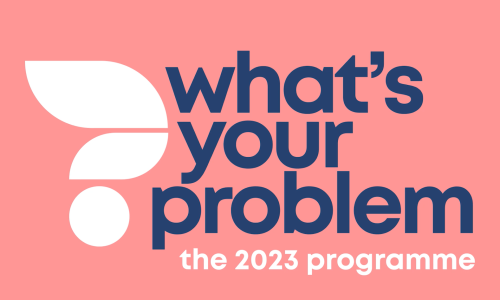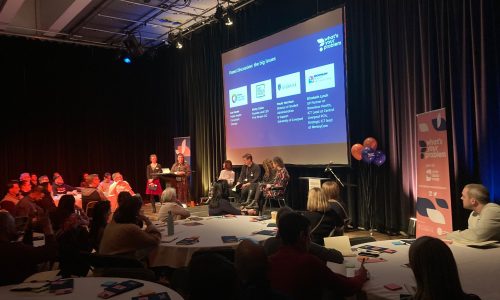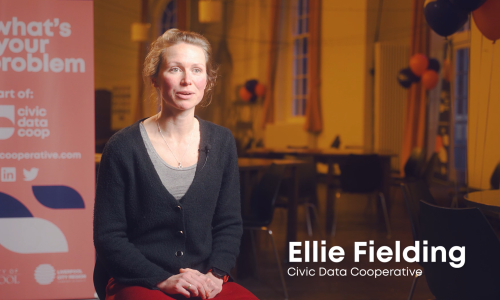"I'm able to handle my thoughts and feelings"
How we are pushing to give people the skills and tools they need to manage their emotional wellbeing
- March 29, 2023
- Categories: Stay in the Loop



At Capacity, we’re about finding the biggest pinch points in our systems and creating space for these big challenges to be better understood. Mental health and wellbeing are something people in our region are grappling with, and this isn’t new. It has been exacerbated by the pandemic and we have found more and more of our work is centering around it. We couldn’t ignore this, so we are explicitly making it one of our challenge areas.
We want to get under the skin of what isn’t working and work hard with partners to ensure everyone in the Liverpool City Region has the skills and tools to manage their wellbeing.
As Capacity, we do enjoy the fact we’re not part of the system – although a great system it is, our independence and objectivity means we can take that big, important step back. The key for us is making sure we’re focusing our solutions on the real problems, taking time to get to the nub of what isn’t working and not just adding noise around the edges of a system.
We know that objectivity alone is only part of the puzzle, walking hand in hand with real-life context is where the magic will really happen. We know that this is big and grizzly, we see the relentless headlines about a crumbling NHS and hear the stories of our young people being paralysed by their image on social media. We work with organisations with mounting demand driven by the increasing costs of living, and we’re alive to the year-on-year rise of people taking their own lives across our region.
Against this stark backdrop, we are pragmatic optimists. We know change will need to be bold, but patient and we are hopeful we can create the conditions for success. For us, this starts with connecting with people living and breathing this challenge- creating space to really shine a light on multiple perspectives that sit behind the headlines of our regional mental health crisis.
A few months later, we could see this thinking beginning to develop in several key areas of focus. We’ve explored the public sector and life challenges that we felt we could start (or continue) to make our mark on. Into the mix we added current unmet needs, combining this with those government priorities that are likely to shape the sector over the next 12 months.
We reduced all this listening and understanding and created Capacity’s ‘Hows and Whys’ – our core focus for the year. Our ‘hows’ are the practical things we touch every day, through systems, strategy and more, and the ‘whys’ are the life experiences we are pledging to help make a reality in 2023.

“There is a perception that the NHS isn’t good enough. But is the NHS the right place to deliver some of this support, and should we be thinking differently to get more support upstream?”
“People are coming [for help] later, so the secondary care and crisis systems are overloaded, we need a much better spread. If we can get the right people down into the community services then we’re going to end up with the right people having the therapy and the right people using the crisis services and have an absolutely fluid system. It just feels like we’re not able to get there at the moment”
Bringing people together who wouldn’t usually connect to chew this through is why we are working in partnership with The Civic Data Cooperative (CDC) to deliver What’s Your Problem. Launched earlier this year, the programme is all about bringing a diverse group of people together; a bunch of people who are bothered about the poor mental health and wellbeing in our region and are curious to collectively grapple with our understanding of the challenge. This group worked to frame what is and isn’t working, with a view that if we have a solid sense of the problem, we stand a better chance at creating solutions that work.

We were blown away by the energy this sparked. Over the space of a month, we had conversations with over one hundred people who wanted to be part of the project. People who were frustrated that money kept going to the wrong organisations, people who were tired of tinkering around the edges of a failing system, and people who were excited about this approach; an approach that didn’t have all the answers but that was led by genuinely listening.




We learned a lot at the launch event and narrowed it down to three big problems:
How do we better reach and support people who are struggling with their experience of significant life events and, what’s the role of powerful human connection in helping people manage that change?
How can we help people to make enough sense of their thoughts and feelings so that they can connect to the right type of help and support, for their particular needs at a time they need it?
How can we make improvements around how we collect and securely share data, manage risk across partnerships and/or better measure and report on outcomes for student mental health?

These problems have roused interest across public services, the third sector and the enterprise sector to think together about how they can create solutions that will work for local people and how we can enable this service delivery by moving money around differently – without tight commissioning briefs, KPIs and lengthy progress reports.
As part of the project, we will award seed funding to the most promising ideas, the ideas that stand the best chance of giving people the tools to manage their mental health and wellbeing.
The seed funding is not life-changing bundles of cash, yes-cash is part of the solution (and we’re working on that bit too!) but the deeper impact we’re already sensing is the shifts in behaviour, people listening hard to improve the design of their solutions and living a culture of collaboration- partnering on strengths. In turn, this will create the case to get the money into the hands of those who will put it to best use.
We appreciate the complexity of disrupting this space. At times, it does feel like it’s a ball of tightly wound rubber bands; all connected but separate and no clear path for which to unpick first. But we’re excited to be in the privileged space of making sense of the problem – listening to people, exploring what an alternative could look like, and helping to tip this into action.